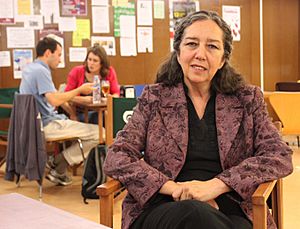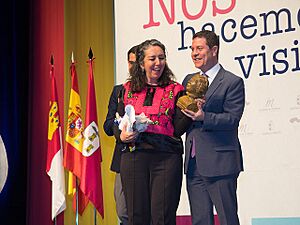Marcela Lagarde facts for kids
Quick facts for kids
Marcela Lagarde
|
|
|---|---|
 |
|
| Born | 30 December 1948 Mexico City, Mexico
|
| Occupation | Academic, researcher, anthropologist and politician |
| Political party | PRD |
María Marcela Lagarde y de los Ríos (born December 30, 1948) is a well-known Mexican professor, writer, and leader. She is famous for her work as a feminist, which means she fights for the rights and equality of women. She has also been a politician, working to make laws that help people.
Contents
Early Life and Career
Marcela Lagarde was born in Mexico City. She studied ethnology (the study of different groups of people) and anthropology (the study of human societies and cultures). As a young student, she was part of the important student movement in 1968, known as Mexico 68.
Since 1975, she has been a professor at the National Autonomous University of Mexico, one of the most important universities in the country. There, she teaches about feminism and women's studies.

Lagarde has also been involved in politics. She was a member of several political parties that support social change. From 2003 to 2006, she was elected to the Mexican Congress, which is like the parliament or group of people who make laws for the country.
Today, she leads a group called the "Network of Researchers for the Life and Freedom of Women." This group studies problems that affect women and works to find solutions.
Fighting Against Violence
What is Femicide?
Marcela Lagarde is famous for introducing the word femicide in Latin America. Femicide is a special term for the killing of women and girls just because they are female.
She explained that femicide is not just a random crime. It often happens when the government and society don't do enough to protect women. Lagarde argued that when these crimes are not investigated or punished, the state is partly responsible. Her work helped people understand that this was a serious and widespread problem.
Making a Change in Mexico
In 2003, the Mexican government created a special group to study femicide, and Lagarde was chosen to lead it. After three years of research, her team presented their findings. Because of their work, the government officially recognized the term "femicide." This was a big step because it meant the government accepted its duty to protect women from this type of violence.
In 2009, an international court, the Inter-American Court of Human Rights, ruled against Mexico. The court said the country had failed to protect hundreds of women who were killed in the city of Ciudad Juarez. This case helped bring more attention to the problem of femicide.
Ideas on Love and Self-Worth
Marcela Lagarde has written a lot about relationships and self-respect. She believes that some old-fashioned ideas about romantic love can be harmful to women.
She says that for a long time, society has taught women that their main role is to be mothers and wives who take care of others. Lagarde thinks this can make women forget about their own dreams and needs. She argues that it's very important for women to love themselves first.
Lagarde asks, how can you truly love someone else if you don't love yourself? She encourages women to discover who they are as individuals. She believes that when women focus only on making others happy, they can lose their own identity. Her message is that having self-worth is key to living a full and happy life.
Selected Books
Marcela Lagarde has written many books about her ideas. Here are some of them:
- (1990) Los cautiverios de las mujeres: madresposas, monjas, ..., presas y locas (The Captivities of Women: Mother-wives, Nuns, ..., Prisoners, and Madwomen)
- (1996) Género y feminismo : desarrollo humano y democracia (Gender and Feminism: Human Development and Democracy)
- (1998) Claves feministas para el poderío y la autonomía de las mujeres (Feminist Keys to the Power and Autonomy of Women)
- (2001) Claves feministas para la autoestima de las mujeres (Feminist Keys to Women's Self-Esteem)
- (2001) Claves feministas para la negociación en el amor (Feminist Keys for Negotiation in Love)
- (2005) Para mis socias de la vida (For My Life Partners)
See also
 In Spanish: Marcela Lagarde para niños
In Spanish: Marcela Lagarde para niños
 | Selma Burke |
 | Pauline Powell Burns |
 | Frederick J. Brown |
 | Robert Blackburn |

